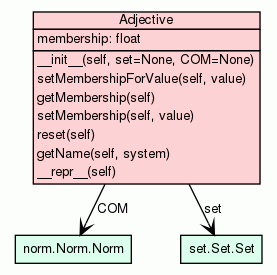| pyfuzzy / |
|---|
| Home | Trees | Indices | Help |
|
|---|
|
|

Describes a ... of a variable.
|
|||
|
|||
|
|||
|
|||
|
|||
|
|||
|
|||
| string |
|
||
|
Inherited from |
|||
|
|||
| fuzzy.norm.Norm.Norm |
_COM = fuzzy.norm.Max.Max()class default is instance variable is None |
||
_set = fuzzy.set.Set.Set()
|
|||
|
|||
| fuzzy.norm.Norm.Norm |
COM norm (if None the class default _COM is used.) |
||
| float |
membership set or calculated membership |
||
| fuzzy.set.Set.Set |
set fuzzy set |
||
|
|||
|
Inherited from |
|||
|
|||
Initialize adjective.
|
Find own name in given system. Returns a tuple (var_name,adj_name) of None. |
Return representation of instance.
|
| Home | Trees | Indices | Help |
|
|---|
| Generated by Epydoc 3.0.1 on Fri Apr 5 22:26:05 2013 | http://epydoc.sourceforge.net |